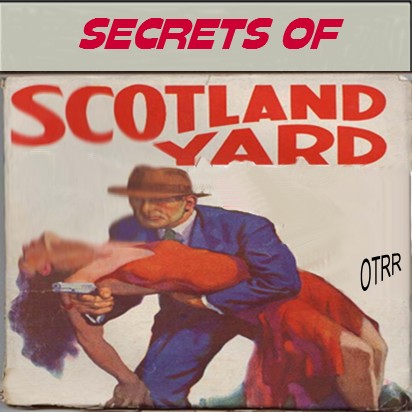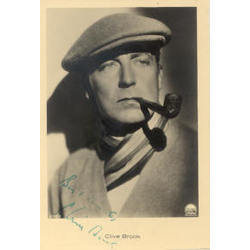CLICK TO DOWNLOAD QUICKTIME PLAYER
|
First show date: 1959 |
|
Last show date: 1961 |
|
Number of shows: |
![]()
![]()
![]()
synposis
|
Secrets of Scotland Yard was the older step sister to The Black Museum. Both series were independent productions created by the Towers Of London syndicate and intended for world-wide distribution. Secrets eventually aired in the USA on the Mutual network in 1957. Both series featured a famous actor as the host. Orson Welles hosted The Black Museum, and Clive Brook, who played Sherlock Holmes in the 1932 movie of the same name, hosted Secrets for the first year or so. Then Brook was replaced with a cheaper actor who played the role of "Superintendent X". Both series also recreated real life stories from Scotland Yard, including the (often gory) details of the crime and the evidence that led the police to the culprit. An Opening Narration: (Dramatic Music: ) Announcer: "How do you do? This is Clive Brook. Of all murderers, perhaps the poisoner is the cleverest and most difficult to catch. There is something peculiarly horrible about a man or woman who uses poison. Theirs is a premeditated crime, and once caught, they have little hope of reprieve. The story I'm going to tell you today concerns a man respected and liked within the community he lived. An officer, he served in the first world war. A clerk to the local justices of the peace. And apparently in every respect, a man of integrity and a worthy citizen. (SFX: Creepy music starts to build underneath narration.) "November 1921. A confidential letter had been received at the home office from Doctor Tom Hinks, who practices in the little market town of Hay on the border of Wales." Dr: "I'm only writing this letter after the most severe conflict in my own mind. To cast suspicion on a fellow human is, I fear, a terrible thing to do. Particularly when he is a well liked friend. And yet, I must do my duty and I have no alternative..."
A Typical Closing Narration Brook: "Armstrong was a gentleman by education. He was a popular fellow who had won the affection of his friends and neighbors. And yet, there he stood at the bar of judgment, convicted of slowly poisoning his wife who had loved and trusted him. Armstrong had held a commission the Army, and had been proud of the uniform he had dishonored. When he was asked if he had anything to say why he should not be given the judgment to die, he squared his shoulders, took one pace forward like a soldier on the parade ground, then stood upright and rigid. 'Nothing,' he said, in a crisp voice. He heard his sentence, then took a parade ground right turn, brought he heels together with a click, and marched off, left foot first, looking straight ahead to the steps leading to the cells. (SFX: Music builds underneath.) "No object would have been served by charging Armstrong with more than one murder, but if it had been necessary, it is probable that proof could have been obtained that he poisoned at least three other people before he murdered his wife. His murders were cowardly, and yet, he died like a brave man. He was executed at Gloucester Prison, and those who were with him to the end, had to admire his calm fortitude." Some of the crimes and trials were quite famous, like the theft of the British Crown Jewels, or even the unsolved murder case of Jack the Ripper. Knowing that the crimes and punishments on Secrets of Scotland Yard |
episodes
| DATE |
TITLE |
LISTEN TO EPISODES |
|
Murder
at Moat Farm
|
||
|
Jean
Pierre Vaquer
|
||
|
Absent
Minded Professor
|
||
|
Accurate
Spending is Essential
|
||
|
|
Bank
of England Robbery
|
|
|
|
Black
Market Murder
|
|
|
|
Blodie
Belgium
|
|
|
|
Bone
from a Voice Box
|
|
|
|
Brothers Staunton
|
|
|
|
buckets of blood
|
|
|
|
Burke and Hare
|
|
|
|
Captain X
|
|
|
|
Charles Peice
|
|
|
|
Counterfeiter
|
|
|
|
Crime on the railway
|
|
|
|
Dr Ruxton Axe Killer
|
|
|
|
Family Solicitor
|
|
|
|
fence
|
|
|
|
Fiction is stranger than truth
|
|
|
|
Florence Maybrick
|
|
|
|
frederick stewart
|
|
|
|
general charles leward
|
|
|
|
george smith
|
|
|
|
great train robbery
|
|
|
|
green eyed monster
|
|
|
|
henry perod
|
|
|
|
henry fauntleroy
|
|
|
|
Hunted hunter
|
|
|
|
jack the ripper
|
|
|
|
jim the penman
|
|
|
|
Just a matchstick and a duster
|
|
|
|
Kindly Doctor
|
|
|
|
Lady is a crook
|
|
|
|
Lady in distress
|
|
|
|
Lesson in love
|
|
|
|
Liverpool bank fraud
|
|
|
|
lucky murderer
|
|
|
|
Mightier than the sword
|
|
|
|
Murder most foul
|
|
|
|
Murder without motive
|
|
|
|
Murderers letter
|
|
|
|
music murder and a makintosh
|
|
|
|
Neville Heath
|
|
|
|
Nurser Waddingham
|
|
|
|
One man to many
|
|
|
|
Perfect detective
|
|
|
|
poisener
|
|
|
|
romantic murder
|
|
|
|
ronald vivien light
|
|
|
|
root of all evil money
|
|
|
|
saved by a piece of paper
|
|
|
|
scales of justice
|
|
|
|
servant problem
|
|
|
|
smoke clings to the hair
|
|
|
|
story of walter miller
|
|
|
|
theft of the british crown jewls
|
|
|
|
witchcraft law
|
![]() Copyright(C) 2007
- 2020. All rights reserved.
Copyright(C) 2007
- 2020. All rights reserved.


